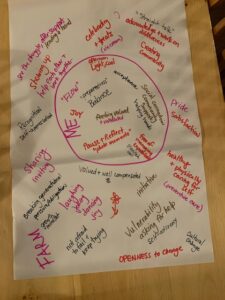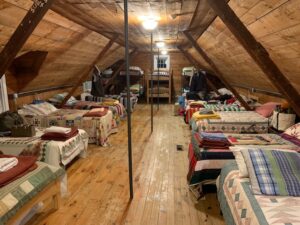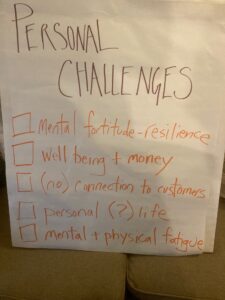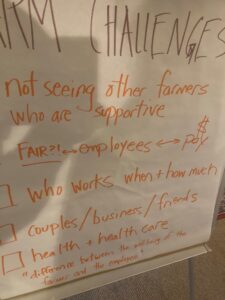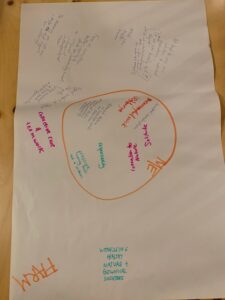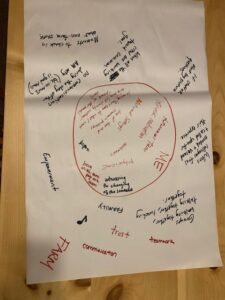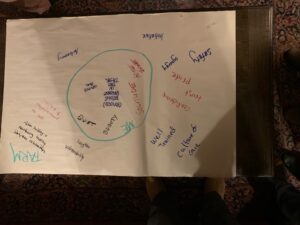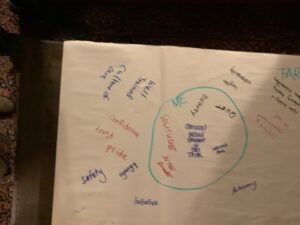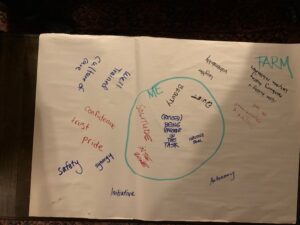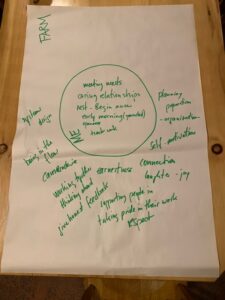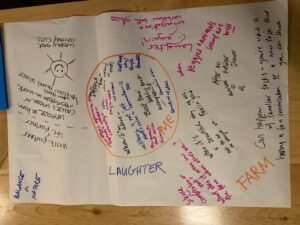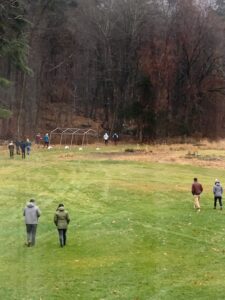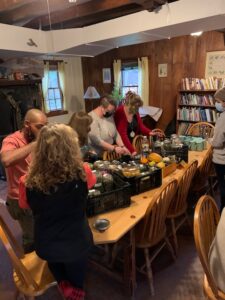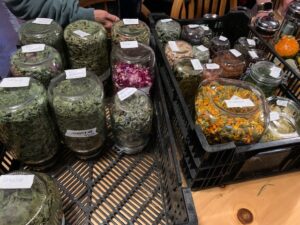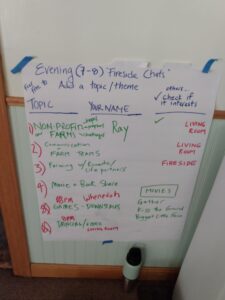Final report for LNE19-377
Project Information
Social sustainability requires adaptation and resilience in the face of change and stress. Most farm sustainability efforts center on economic or environmental concerns; few sustainability projects focus on social sustainability with educational interventions to enhance relational skills and social supports.
Nine focus groups with 75 participants established several interesting findings with concrete examples of indicators of sustainability and strategies to support sustainability. Farmers face a range of perceived stressors (e.g.: lack of time, work life balance, low pay, customer complaints), indicators of quality of life (e.g.: having skills needed for the job, connection to customers and other community members, value and meaning of farming), and strategies to mitigate stressors (e.g.: organizational skills, time alone/reflective time, time with others not working).
We note that this project began before COVID, when all the focus groups were held, and the retreats were delayed due to COVID. When it was safe to do so (winter 2021) in person retreats were held. Online retreats were also held in 2021. The intent of the project was always to compare in-person and online offerings, however the magnitude of each changed by necessity after COVID. In addition to adjustments to accommodate new public health constraints limiting travel and gathering, program offerings were adapted in response to the shifting perspectives, priorities, needs that emerged for the farmer participants during the pandemic.
Curricula for online and in-person retreats were developed. Each format focused on self-reflection, skill development in active listening and asking open-ended questions, and a learning circle for more intensive peer-to-peer listening and support. Participants could express preference for in-person or online retreats and were placed into the setting that matched their availability and the spaces available. Final retreat numbers were 27 for online and 29 for in-person.
Once the retreats were held, one participant commented that one of the most important moments for them was “Hearing so many different versions of what "farming" means to folks and seeing the patterns of burnout are pretty much the same.” The inquiry and conversations in retreat spaces included three areas: 1) health and well-being; 2) equity and fairness; and 3) community connections.
Participants in online and in-person sessions increased skills, reported that the experience was “life changing” and experienced the in-depth learning and practice of skill development to be of profound importance. Previous research suggested that the peer-to-peer environment with other farmers would be critical, and 46% of participants who completed a follow up survey mentioned this in their evaluations although it was not explicitly asked. Farmers in both in-person and online settings appreciated the format, the space that was created, and the opportunities for self-reflection. Facilitator preparation and intention of creating a welcoming and safe space both online and in-person was noted. Both delivery methods are effective for creating space for farmers to participate in self-reflection and connection, though the in-person setting allowed more complete retreat experience without participants having to go back to their daily routines then come back to retreat the following day.
Retreat design and materials are under revision based on farmer feedback, and can be made available to interested researchers, farmers, and educators; the principal investigator may be contacted for additional information. Future projects also include exploring how peer-to-peer circles can be developed with social sustainability in mind. As well, future research efforts could replicate the focus groups and explore how COVID emerges as a factor in farmer personal sustainability.
As a result of participating in the cohorts, 83% of participating farmers (n=30) who gross at least $50,000 annually, report improvement in quality of life and personal wellness as measured pre-post cohort intervention. After implementing social sustainability plans, participating farmers and 108 family members or employees report positive changes to the farm environment or reduced employee turnover.
Problem and Justification:
Social sustainability requires adaptation and resilience in the face of change and stress. The well-being, quality of life, and social sustainability of US farmers, farm families, and farmworkers is a great concern because of farm labor shortfalls, increasingly globalized markets, climate change, and changes in technology and consumer preferences. Most farm sustainability efforts center on economic or environmental concerns; though few projects focus on social sustainability with educational interventions to enhance relational skills and social supports. Maine farmers attending a recent farmer field tour and Northeast farmers responding to a social sustainability survey expressed a desire for peer learning and opportunities to convene in a retreat setting to discuss issues of social sustainability. Agricultural service providers will also feel more prepared to identify/address issues of social sustainability when farmers validate the need.
Solution and Approach:
In this project we used applied research with farmers and agricultural service providers to test the validity of three facets of social sustainability: 1) health and well-being; 2) equity; and 3) community connections. The unexpected arrival of a global pandemic and its associated chaos and crises presented a major challenge to all aspects of the initial project design--but it also delivered a new social context in which discussion of health stresses, economic uncertainty, constraints on social connection was more common and finding relief from the strain was also more urgent than ever. Instead of clinging to the specific details of the initial project plans as the COVID situation shifted, we were able to lean on our farmer participants directly to provide guidance for adjustments to project activities and approaches that would most effectively suit their evolving needs and circumstances. Based on a series of formal online and in-person focus groups and many informal follow-up conversations, an educational curriculum was developed to address self, family and employees, and community connections through a series of 5 educational webinars, leading to a pair of 3-day intensive retreats (one in-person and one online) and a series of facilitated monthly online "Peer Listening/Learning Sessions" for participants to continue sharing, building and practicing their skills and strengthening their connections to each other. The outcomes, impacts, and behavior change on farms and in communities were documented by standard evaluation approaches (i.e. surveys, interviews). In addition to using formal educational channels at conferences and other professional gatherings, participants were encouraged to share insights and information with other farmers and service providers via informal peer-to-peer networking for promoting social connectedness and fostering a peer community of practice. This was further supported by the development of a Be Well Farming listserv and encouragement to connect and keep in touch directly with their peers. In turn, many participants found that the increased feelings of support and community served to build resilience for times of stress and economic strain--not only because they felt able to access peer support when needed, but also because they felt less distressed/more self-confident, having developed a greater depth of experience and healthier perspective by virtue of showing up to support or hear others. Through outreach, farmers learned from program participants about social sustainability: how to build community connections, support equity, address health and well-being, and improve on-farm work environments for themselves and family members or employees. Within their individual farm system, many participants shared approaches to strengthen individual and team well-being, and a number also implemented new or revised management systems incorporating the tools and principles taught in the retreats.
Performance Targets:
- 20 farmers and 5 service providers report increased confidence understanding and addressing farm social sustainability as a result of participation in advisory group membership, retreat(s), work with cohort farms, or attending a training.
Cooperators
Research
How can indicators of “social sustainability” measure farmer community connection, equity, health and wellbeing? How do deliberate interventions (retreats and online communities) create experiences of social support for farmers? How do farmers’ individual actions through their social sustainability strategies and community outreach enhance social sustainability with family members, employees, and other farmers?
Null Hypotheses:
- Social sustainability cannot be measured through indicators.
- Social sustainability cannot be changed by deliberate intervention, planning, and peer dialogue.
- Intervention methods are equally effective (in-person or on-line) in enhancing social sustainability.
- Farmers will not experience social connection from an ongoing online community.
Validation of Social Sustainability Indicators
To assess which metrics meaningfully capture or describe social sustainability for individual farmers, individuals responded to prompts during retreats. These prompts were informed by focus group data where indicators of sustainability were discussed. The three primary areas of inquiry during retreats were 1) health and well-being, 2) equity, and 3) community connections. Individual farmers selected indicators of social sustainability that were most personally relevant and used these in their reflective and discussion activities.
Data Analysis & Interpretation
Fifteen hours of focus group audio recordings were transcribed and analyzed using a coding process developed by the project’s research team and advisors. Using a coding rubric developed by the team, two coders conducted independent descriptive analyses of each transcript to identify and classify each occurrence of relevant data within general conceptual categories ascribed to farmer social sustainability by type (indicator, stressor, strategy) and thematic dimension (well-being, community connections, equity & fairness). Quotations were selected to illustrate and explain examples of indicators, stressors and strategies in each theme.
Data was also collected in surveys after retreats to understand the experiences of the participants as a result participating in a social sustainability activity (the retreat) and to assess their intentions related to social sustainability at that timepoint. Follow up surveys were collected to share stories and examples of how participation had an impact on their lives post-retreat.
Early in the second project year, data coding from the farmer focus groups was completed and then organized into an Airtable database to allow the team maximum flexibility to filter and compare data subsets across all the different focus groups, project themes, and all interpretive categories. The team used this tool to conduct some interpretive data synthesis to link themes, test our hypotheses, shape new questions and distill key findings to share with farmers and service providers. This work was not completed by the end of the grant period due to the amount of data and capacity of the team to complete the analysis. A more complete analysis is expected in summer of 2023.
The tool was a useful resource for the project team both in theory and function. It helped guide the scope and content of the programming that was developed; and also functioned as a searchable reference that facilitators mined for relevant quotes and anecdotes on a specific topic for an activity or discussion prompt. This allowed us to design activities around the real/concrete words, feelings, and situations directly expressed by other farmer-peers, to inspire deep personal reflection, rich group discussions and connections among program participants by virtue of the natural resonance of these relatable prompts. The data were repeatedly accessed to inform the design and content of the retreats.
The data was used to support program development, and will be used for future synthesis of key research results for publication. Additionally, a compilation of particularly resonant quotes, anecdotes and thought-provoking questions was used from the raw ‘data’ to create a valuable program resource full of rich real-world content to draw upon for upcoming programming, outreach and other engagement materials. In June 2023, findings will be presented at the Agriculture, Food, and Human Values conference and then used in an academic publication.
We examined our null hypotheses:
- Social sustainability cannot be measured through indicators. This research suggests that indicators can be effective for measuring social sustainability, however we did not test this hypothesis quantitatively. Our qualitative data points to some shared experiences of farmers in how they described indicators of and strategies for well-being, community connections, and equity. Frustrations around economic systems were prevalent, as well as farmers' desire to treat employees equitably and frustration around their capacity to do so. In practice during retreats, each farmers' personal experience informed their path and what they chose to reflect about and/or disclose in the peer learning circles. The evaluation feedback suggested that this flexibility to personalize an experience and to do so in peer to peer learning circles is what helped provide experiences of social connection.
- Social sustainability cannot be changed by deliberate intervention, planning, and peer dialogue. In this project, relationships were formed during retreat (aka deliberate intervention) with specific interactive exercises and opportunities for self-reflection, peer dialogue, and connection that created a social network and shared common experience. The data analysis suggests that social connections were formed through both methods, and through very intentional design of reflective exercises and peer to peer dialogue.
- Intervention methods are equally effective (in-person or on-line) in enhancing social sustainability. We found that both in-person and online methods to enhance social sustainability were effective. A variable that we had not anticipated and could not plan for was COVID, which completely changed the landscape of online interactivity and meeting spaces that was not as prevalent prior to the pandemic. It is likely that individuals gained skills in online connection during the pandemic that they applied when they participated in the retreat, which increased the likelihood of online retreat efficacy, but was not separately evaluated.
- Farmers will not experience social connection from an ongoing online community. Results from the online community found that social connection was established. The opportunity to connect with other farmers locally (even on Zoom) was powerful for some farmers, and the opportunity to connect with farmers with the experiential exercises that were provided, was powerful for most.
Conclusions
- Farmers are hungry for conversations about well-being and social sustainability, and find there too few opportunities to talk about personal sustainability, particularly among peers who understand their situation.
- Well-being, Equity & Fairness, and Community Connections comprise 3 fundamental elements of overall social sustainability
- Farmers were eager for skills--and even more eager for practice
- Skills around listening and sharing can be taught and replicated with groups online and in-person
- The experience of listening and being heard, deeply, contributed to transformational change at the individual level
- The impact of an in-person retreat that included shared meals, walks, group activities, personal reflective activities, informal connections contributed to new relationships that led to lasting connections and continued peer-to-peer support well beyond the retreat itself
Recommendations
- one of the most effective strategies to support individuals is to create opportunities for personal reflection, interpersonal connection, and to do so with as few barriers to access as possible.
- support participants to learn skills, practice them, and then debrief and reflect in a peer group
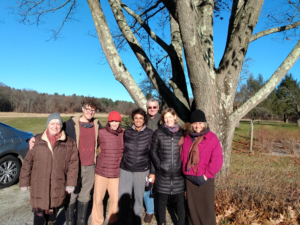
Education
The specific educational approaches used and content areas of focus for this project were co- developed by participating farmers, service providers, researchers and area specialists based on a participant action research framework. The early phase of work focused on engaging farmers to refine project educational priorities and methods through a series of in-person and virtual focus groups held across the region. The results of these conversations were then used to hone the scope of long-term project goals, shape the nature of specific project activities, and to guide the development of effective educational methods and accessible outreach tools implemented throughout the rest of the project.
Project year 2 built toward a pair of parallel capstone multi-day retreats—one held in-person at the Friendly Crossways Retreat Center in Harvard, MA and, and the other conducted virtually via the Zoom videoconference platform. Project year 3 largely focused on developing and delivering follow-up programming to support cohort participants in deepening their practice and strengthening their social connections with each other and within their own local communities through a series of monthly facilitated online sessions, peer-to-peer and professional mentoring, peer listservs and other activities.
Program Adaptation & Development
Unsurprisingly, the COVID-19 pandemic significantly impacted the timeline, delivery and scope of expected project activities. This extended period of uncertainty and change in the personal and farm-lives of project participants, and the strict public health limitations on interstate travel and in-person gathering presented major obstacles to project implementation as originally envisioned. Though, instead of a total derailment of the proposed project, it presented an opportunity to leverage the strength of the participant-centered research model to navigate a constructive change-of-course toward the same overarching project purpose and outcomes. As a result, a lot more attention was devoted to the collaborative reflection, connection and reorientation necessary to effectively modify and adapt project activities, methods, timelines, and even specific content items, in order to best meet the current needs of participants within the constraints placed upon us all by the continued pandemic.
Due to the continued uncertainty over the safety/feasibility of coordinating in-person events, we ultimately made the decision to adapt all program activities for remote delivery in year 2, which allowed us to move forward in a direction that we might not have otherwise. A series of online workshops in early 2021 were co-developed and delivered in collaboration with a diverse team of external educators/facilitators. These partners were engaged both for their deep personal and professional experience in social equity, interpersonal/relational dynamics, personal well-being and agriculture—as well as for their willingness to apply that expertise to support this project’s development by sharing their approach and guidance for effective remote engagement of social/personal/non-technical subjects. Each workshop differed in subject matter and style, though all shared common objectives of providing a grounding in the concept of social sustainability, supporting development of peer networks and mentor relationships, and soliciting input and fostering continued engagement from farmer participants. The series was well-received with many farmers attending multiple sessions, and numerous requests for presentations of related topics or additional discussion.
With luck and lots of extra safety precautions, we were able to host a capstone 3-day retreat in-person in December 2021—and, also a big success, we also decided to host a second 3-day retreat online based on farmer feedback and what we learned hosting online programming over the previous year.
Milestones
1. 100 farmers, farm family members, service providers, farm employees, and service providers participate in 3-6 in-person or online focus groups to prioritize and define indicators of well-being, equity, and community connection aspects of social sustainability.
90
10
75
4
January 31, 2020
Completed
March 02, 2020
We held 4 regional in-person focus groups in Midcoast Maine (Nov,2019), Central Massachusetts (Jan, 2020), Albary, New York, (Jan, 2020) and the Hudson Valley, New York (Feb, 2020). In addition, 5 sector-specific focus groups were conducted remotely via video conference in February and March (2020) incorporating farmer participants from across the northeast region: vegetable/fruit/orchard (2), livestock, dairy, and agronomic crops.
Our research team developed a coding rubric and two-stage analysis process for systematic analysis and interpretation of the focus group data derived from audio transcripts.
2. 300 NE farmers, farm family members, farm employees and/or service providers respond to survey to validate indicators.
270
30
347
33
March 01, 2021
Completed
November 30, 2022
As we adapted our project activities and timeline to meet the evolving logistical constraints on in-person programming and the shifting priorities/availability of farmer participants caused by the pandemic, the project team realized that this milestone no longer had the same relevance that it did within the sequencing of project activities that had initially been conceived in a pre-pandemic context. Because the farmer focus groups exceeded the team’s expectations in terms of the breadth of farmer participation and the richness of data gathered, we determined that the insight provided by that material provided the guidance needed to shape the structure and content of subsequent programming development. Instead of a single discrete community survey, we gathered participant perspectives on the relevance of these indicators through open-ended prompts on registration questionnaires and during project activities.
3. 1,000 Northeast farmers, farm family members, farm employees and service providers learn about the project.
900
100
900
100
December 31, 2021
Completed
November 30, 2022
An informational project website was created smallfarms.cornell.edu/projects/be-well-farming/ to serve as a nexus for ongoing project outreach and engagement with farmers. It was updated and expanded over the course of the project as a central location to post program announcements, share program materials, facilitate peer networking, and develop a curated list of existing resources and references to support farmer sustainability. A public listserv <bewellfarming@elist.tufts.edu> was created to provide a platform for community dialogue and networking among farmers (and service providers) regarding topics of social sustainability and also to serve as a direct communication conduit for sharing program announcements, materials and other relevant resources.
In order to preserve the momentum of this community beyond the period of this grant, in 2023 we anticipate combining efforts with the Maine Farm & Ranch Stress Assistance Network to continue providing a platform for farmers and service providers to share messages and opportunities related to farmer and farmworker health and wellbeing.
4. Out of 100 focus group participants invited to apply, 40 people total (1-2 individuals per farm and up to three service providers) selected for in-person retreats.
37
3
46
10
October 01, 2021
Completed
December 12, 2021
Two 3-day Be Well Winter Retreats for Farmers were held in December 2021. One cohort of 24 farmers and 3 service providers participated entirely online via Zoom, and a parallel cohort of 22 farmers and 7 service providers met in-person at the Friendly Crossways Retreat Center in Harvard, MA.
(8 service providers were also farmers)
5. 40 individuals complete pre-retreat self-assessment, participate in in-person retreat and begin selection of social sustainability strategies.
37
3
46
10
July 15, 2022
Completed
December 12, 2021
All participants in the remote retreat (Dec 1-3, 2021) and in-person retreat (Dec 10-12, 2021) cohorts completed a pre-retreat assessment and priorities questionnaire ahead of their gathering. The in-person cohort was also invited to complete an additional open-ended ‘tell us a story’ exercise for guided individual self-reflection ahead of the retreat program. Over the course of the retreat experience, participants were encouraged to reflect on their individual goals regarding wellbeing, both personally and for their farm, and to consider which of the tools/practices addressed in the retreat would be most appropriate for their individual needs and communication style. Among the various individual takeaways, a common request emerged for a regular facilitated gathering (online) to provide an opportunity for retreat participants to keep connected and supported socially and to continue learning and practicing some of the communication strategies they had been introduced to during the retreats. As a result the program team facilitated a monthly series of Be Well Farming Peer Learning Circles that typically brought together 10-15 participants (from both retreat cohorts) interested in learning, listening and supporting one another using the practice of ‘open & honest questions.’
6. At least three online professional development (PD) offerings and three state-based gatherings (one each in NY, MA, ME) held for retreat participants (n=40) and up to 60 additional farmers, farm families and employees in each state.
100
5
117
10
September 01, 2022
Completed
March 28, 2022
Programming scope and activities were adapted to accommodate remote, web-based, participant engagement due to ongoing constraints on in-person gatherings due to COVID-19. An initial series of 5 online workshops were developed and offered in early 2021 in collaboration with a diverse team of external facilitators selected for their personal and professional experience grounded in social equity, interpersonal/relational dynamics, personal well-being and agriculture. A second set of 3 “Peer Learning Circle” sessions were developed for winter 2022 as an outgrowth of the 3-day winter retreats, reflecting the knowledge gained and incorporating the input of farmer participants, facilitators and advisory partners. The Peer Learning Circles each provided a practice opportunity for participants to listen, reflect, and practice methods learned in the retreats.
7. At least 16 retreat participants (40% of the cohort) join in-person and/or online peer-to- peer meet-ups (in addition to the PD sessions) to provide and receive peer support.
14
2
22
7
September 01, 2022
Completed
March 28, 2022
A set of 3 online monthly “Peer Learning Circle” sessions were facilitated in the winter of 2022 as an outgrowth of the 3-day winter retreats, reflecting the knowledge gained and incorporating the input of farmer participants, facilitators and advisory partners. These sessions enabled continued practice of the active listening techniques learned in the retreats, such as 'open and honest questions,' and also connected participants from both the virtual and in-person retreat cohorts to expand their personal networks.
8. At least eight retreat participants (20% of the cohort) share their findings about social sustainability informally with at least three other producers through localized peer networks
7
1
3
2
September 15, 2022
Completed
November 30, 2022
When reflecting on the retreat and their personal take-aways at the end of the experience, nearly all participants explicitly asserted plans to directly incorporate particular communication techniques, or certain practices for supporting personal wellbeing that had resonated with them during the retreat to improve their personal social sustainability at home and on the farm. A few participants also expressed serious intentions to introduce and adapt a particular communication tool or management strategy into the farm workplace in order to improve the overall social sustainability of the farm business and workers. Though data was not gathered formally across the cohorts to track the extent and impacts of interventions implemented in the growing season following the retreat, a number of participants shared compelling reflections of their experiences integrating different tools and strategies on their farms within the monthly Peer Learning/Listening sessions, or via written reflection shared with the Project Team.
Knowledge gained from participation in this project was shared with the Cultivemos Network (Farm and Ranch stress Assistance Network Northeast): 1 service provider who participated in the retreat, 3 members of the project team, and 1 who participated in focus group
9. At least 36 retreat participants (90% of cohort) participate in capstone in-person retreat (expected Spring-Summer 2022)
33
3
September 15, 2022
Incomplete
Sadly, due to the impacts of COVID compounded by growing season constraints for farmer participants, it wasn't possible to organize another multi-state retreat within the project time period.
10. Four of the participating producers and three service providers expand community outreach through presentations at farmer conferences that reach 75 new individuals, including 20 agricultural service providers.
4
3
13
2
October 15, 2022
Incomplete
Unfortunately, the quantitative data we gathered with respect to participant presentations is limited and did not effectively track the impact on # of "new individuals" reached, so were were unable to verify the number of conferences/75 farmers/20 service providers.
However, we know from communication with program participants that many (these numbers are recorded above) carried the tools and practices from the retreats back to their home farms and local agricultural networks to share in various different ways--including formal and informal presentations at conferences or other farm gatherings. We heard, in many variations, from participants a sense of motivation and empowerment to recreate in their home community the type of supportive and connective space that they found among the peer farmers and service providers at the Be Well Farming retreat.
From in-person retreat participants:
- "The most distinctive benefits I think were the skills we gained in communication and listening. They were truly radical and transformative. I have already begun applying them to my personal and professional life."
- "I loved Deb's practice of asking her team first thing in the morning if anyone had a question or anything they'd like to share/discuss. I've already started implementing that with my farm team and it has helps to nip problems in the bud which could/would grow into larger problems, and it also creates an energy dynamic of caring, concern and well being right at the start of the work day."
81% of the in-person retreat participants who completed follow up surveys (n=13) responded that practices had changed and for most of them it was the skill of listening they were doing more of.
For many, the focus was on their farm workplace, by introducing new communication tools or practices, and a few felt called to reach beyond their own farm to share their new skills and perspective with a wider group of peers at regional gatherings. One particularly compelling example that resulted from this motivation to connect, share, and practice was a participant who decided to host a day-long conference for 25 farmers in her county that ended with a workshop she led on active listening and open & honest questions:
"Last January, upon returning from the retreat, I planned, coordinated, and ran a small conference for farmers in my county. Twenty-five of us gathered to share successes and failures, or to share knowledge on certain areas of expertise. At the end of the day, I held a workshop on active listening.
The farmers broke off into groups of 3-4. Everyone was given 10 minutes to share their story – their frustrations, challenges, concerns, whatever. Upon the end of the 10 minutes, the group was opened for open and honest questions.
It was incredible to see and hear what happened. People had profound realizations. After the activity, everyone walked back into the group revitalized and reenergized. People came up to me and thanked me for the activity.
People not only found solutions but felt heard and supported. It was the closest thing I have ever seen to real authentic COMMUNITY."
Milestone activities and participation summary
Educational activities:
Over the fall/winter of 2019-2020, a total of 9 farmer focus groups were conducted across the project region. Four (4) regional focus groups were held in-person in Maine, Massachusetts, and New York (2) in partnership with existing agricultural meetings, and 5 sector-specific focus groups were hosted online via Zoom for participants across the northeast from vegetable/fruit/orchard (2), livestock, dairy, and agronomic/row crop sectors. A total of 75 farmers and 4 service providers participated in one of the focus groups, and 26 farmers who could not attend reached out to request to be kept informed about project updates and future opportunities for engagement.
5 Winter 2021 Webinars (serving 117 farmers, 10 service providers)
• "Balance, Health and Passion" part 1 - Virtual Session
• "Balance, Health and Passion" part 2 - Virtual Session
• "Empathic Listening" - Virtual Session
• "Exploring Fairness & Power on the Farm" - Virtual Session
• "Empathic Listening" - Virtual Session (repeat)
2 – 3-day Be Well Farming Winter Retreat for Farmers, online and in-person versions (serving 46 farmers & 2 service providers—including 10 farmers who also have roles as service providers)
3 - online monthly Peer Learning/Listening Circles for retreat participants following the in-person and online retreats to provide an opportunity for continued practice of active listening techniques, strengthening of peer-support connections. (22 farmers, 7 service providers)
Participation summary:
Learning Outcomes
Program participants reported positive change in knowledge, skills, and awareness either by a flash poll delivered at the end of an online program, or via post-program evaluation form with open-ended questions about the content shared and how it might influence their future plans/practices.
The most commonly noted change in awareness and knowledge fell into two large categories: 1) individuals' capacity to listen and be listened to and 2) the opportunity to connect to other farmers. These speaks to our research hypotheses that skills for social sustainability can be taught effectively in online and in-person settings, and also that bringing farmers together really meets a need for community connection. And it is likely the merging of these two opportunities: learning to listen and be vulnerable with other farmers that made this opportunity unique and powerful.
When asked "what has been the most distinctive and/or important benefit of participation," participants said about listening:
- This was truly a life changing experience that has really stayed with me even after coming home from the retreat. The most distinctive benefits I think were the skills we gained in communication and listening. They were truly radical and transformative. I have already begun applying them to my personal and professional life.
- I appreciated being able to take away some specific tools, like the open honest questions framework and the case clinic format. While I really enjoyed the retreat experience, it's the take-home tools that stand to have a more lasting impact than just the weekend.
- Learning how to *listen* and ask open and honest questions.
- Learning tools for listening and asking questions that lead to unexpected places, rather than to focus directly on solving a problem and moving forward. This approach takes time, but ends up addressing big picture problems & opportunities, which is much more sustainable and generative!
- The most distinctive and important benefits for me were the communication skills and tools I gained, specifically being a better, more open listener and not rushing to solve someone's problem or offer a solution, but rather to help create a safe space where the person feels encouraged to express themselves and perhaps discover a solution themselves.
- Learning how to listen and ask open and honest questions. Being given the time to speak without interruption. Learning how to listen with our hearts instead of our minds. The space to be vulnerable and without judgment!
- I got a lot more than expected out of the ""open and honest"" questions framework and have already thought about asking more of these questions both in work and in life!
And participants spoke equally positively about the opportunity to connect with peers:
- Being able to meet farmers and to learn about their experiences and who they are was very important to me. As well the emphasis on community and the importance of mental wellness.
- Unity in Solidarity. Knowing that although we tend to the land in different parts of the country, in different methods we’re unified in Spirit through our Love to nurture and provide.
- Having the support and non-judgement of a group of farmers was an incredibly powerful experience. As farmers, we all struggle with similar challenges as our baseline and having that commonality and communion with this group was just incredible. Not having to explain the contradiction of the joy and hardships that are inherent to our daily lives before getting into the meat of our personal issues was immensely helpful and having that in common jump started the trust within the circle.
- Feeling comfortable being open and honest with fellow farmers - not feeling judged. The validation of believing that wellness is an integral part of the farm plan, if not the most important part.
- I am inspired and grounded by the warmth of participants and facilitators. Everyone showed up with their whole selves and stayed present the entire time. We all put ourselves out there, just by attending the retreat, and for the facilitators by getting up there and leading us. It felt exciting to be part of this first group of farmers to participate.
- A pure sense of acceptance and community!
- Hearing so many different versions of what "farming" means to folks, and seeing the patterns of burnout are pretty much the same.
- "I was surprised how deep the conversations were able to get even via Zoom- I think the team did a wonderful job setting up the groundwork for a safe space for people to share, which was really special.
Performance Target Outcomes
Target #1
30
develop/implement social sustainability strategies
not measured
improved work satisfaction, employee retention, personal well-being, equity, community connections on farm
20
participated in project advisory group, work with cohort farms, or attended a training
not measured
reported increased confidence and understanding of how to address farm social sustainability through community connection, skill development, and team building
All performance outcomes were verified through follow up surveys or direct work with participants from the BeWell project 80% of in-person retreat participants who provided feedback after completing a follow up survey reported changes in practice, specifically listening skills. These skills were put to use on their farms and with their farm teams.
In addition, of the 26 surveys returned from retreat participants (15 from in-person retreat, 11 from virtual retreat representing a 55% return rate) , 74% reported an awareness and feeling of connection with other farmers, 77% reported increased listening skills, and 74% reported knowledge of wellness and/or mental well being. Based on these returns, in fact likely more than 26 farmers "made a change or adopted a practice as a result of participating in this project." Nearly every person who responded made a change, whether it was in listening, in connection to others, or in connection to self, however we were able to verify 26 from follow up surveys.
In review, we did not explicitly ask about "improved work satisfaction, employee retention, personal well-being, equity, community connections on farm" in follow up surveys. In fact, some long term follow up responses showed that farmers left the positions they'd been in when they came to the retreat. And this was not a failure of the project, it was actually a success and one that was not anticipated. Our team had not anticipated that it was a change in situation that would lead to greater satisfaction for the farmers. This included one service provider who left her job and took a significant amount of time off. She ended going back into the food system for work, but this was after long reflection.
Additional Project Outcomes
Professional Community of Practice
By virtue of the diverse range of interests, skill sets and expertise on the topic of social sustainability represented among the advisors assembled for this project, the advisory team became a learning community in its own right. In addition to providing direct input and guidance on this project, advisory meetings were structured to include a professional/network development segment which allowed a member to make a presentation or lead a discussion related to their particular area of focus. For example, project advisors Maria Pippidis and Bonnie Braun presented their work on Farm and Family Risk and Resilience and shared a recently published guide which provided an opportunity for the members to become familiar with an important new resource guide for resilience-building in farm families. This activity enhanced this specific project as well as the work of individual advisory members in their efforts outside of this project.
As annual regional gatherings and conferences begin to re-emerge as remote versions due to COVID restrictions, our project team leveraged the opportunity to expand our outreach and farmer engagement by facilitating online workshops and presentations at a number of such events. Some programs included “Dealing with Stress” a two-part webinar offered in partnership with the Maine Organic Farmers and Gardeners Association (MOFGA) and University of Maine Cooperative Extension, as well as two extended participatory workshops at the online MOFGA Farmer to Farmer Conference: “Cultivating Emotional Resiliency” (52 participants) and “Farm Crew Management and Communication” (76 participants).
New Grants and Collaborations
Although no new grants were written explicitly based on this project, some funds (noted above as the "2") from the New York State and Maine Department of Agriculture Farm and Ranch Stress Assistance Networks were allocated for state-level efforts either replicating or adapting aspects of this NESARE-funded work. Regionally, one of our team members participating in Cultivemos, the regional Farm and Ranch Stress Network, said, "With the Cultivemos work, I have significantly expanded my network and connections, and I think the Be-Well Farming Project gave me the confidence to show up in those spaces as a more informed service provider."
New collaborations included members of the team working together for this first time, and new collaborations with farmers who participated in the retreats. This included one virtual retreat participant who co-led one of the late winter '22 Peer Learning Circles, and one in-person retreat participant who was recruited to join a working group for Cultivemos concerning sustainability of the network.
Quotes & Participant Anecdotes
Regarding the thematic dimension of community connection, one farmer who regularly hosts periodic gatherings on the farm with customers and other community members, noted:
“...it's been lovely, what a difference it's been to just sit and appreciate, you know, the work at some point during the week and have other people's perspective and just have the conversation around what it is to be a farmer...And it's been lovely. It's not just about sales. It's really about just making the connection.”
As another example, the thematic dimension of equity was aptly addressed by a farmer who spoke of their employees:
“So we talk constantly, since we're all part of a linear value chain, talk constantly about what what's coming up in their life, what might be a constraint for them, because we have to keep things moving through a pipeline, and I make sure that everyone feels like their agenda is really respected...So it takes a lot of communication. And of course, in terms of the view, I have a, you know, a different view because I'm always looking at sort of the big picture...But I make sure that we all respect each other's views, you know what I mean? And it's, it's been interesting. It's also been really enlightening. And really, it's been really beautiful, actually.”
One participant in the in-person retreat led a local event:
The area of "personal sustainability" in farming feels incredibly relevant and important. This includes providing opportunities for farmers to come together and develop connections and have opportunities for deep reflection. As our team pivoted with COVID, and reflected on our offerings, we did have areas that we thought could be adapted. These included:
- Diversity: exploring ways to offer spaces for farmers of color, hosted by facilitators of color and to do so in spaces that could discuss personal sustainability openly and honestly and provide for folks to connect and feel supported.
- Methodology for retreat attendance: offer universal in-person retreat attendance for those willing and interested. We had offered a choice and preference, but some farmers said they could do either in-person or online and were offered a space in what was available. Instead, it would have been nice that if a farmer was open and available for an in-person experience, we could be responsive to all that were interested. One limiting factor here was COVID in how the design and number of in-person offerings changed.
- Research questions and expectations. We shifted focus away from folx developing their own personal sustainability plans and did not provide the robust follow up that could have enriched the farmers' experience. In hindsight, more support for the "post retreat" time, could have led for richer opportunities for continued connection and peer support. These opportunities may not be lost-they can still be followed up on and supported, but did not happen during the project period.
- More robust and consistent data gathering to understand everyone's experiences and better use of this information to develop resources and opportunities for farmers.
